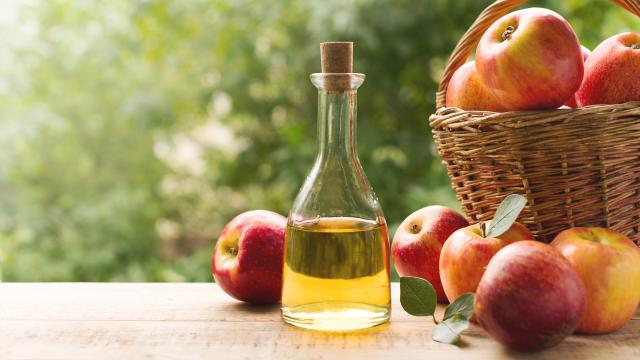Sometimes, when I want to feel mad, I read about the crap the internet tries to pass off as weight loss hacks. Because they are all so, so bad.
Articles about weight loss hacks never actually include hacks, but the headline always swears they do. A recent example: this Telegraph article titled, and I swear I am not making this up, “Why drinking vinegar could be the secret to midlife weight loss.”
The article does not actually tell us why vinegar could be the secret to midlife weight loss, because it can’t do that, because it isn’t. Instead, the writer taste-tests different vinegar-based beverages. They taste good, it turns out. Nobody who has ever enjoyed a sip of lemonade should be surprised that sour ingredients can make a drink taste refreshing. But while the writer was making this discovery for herself, they forgot to cover the weight loss hack.
We’ve previously written about whether vinegar will help you lose weight here, so I’m not going to bother debunking the headline’s claim directly. (Bottom line: no, science has not shown vinegar to be a weight-loss elixir. It has, on a few occasions, shown that one of the chemical components of vinegar can cause subtle shifts in gene expression in rats. That’s not the same thing, and anybody who implies they are the same is a bad person and they should feel bad.)
I will bother to say that I hate these articles (and TikTok videos, and Instagram posts, and all the other ways people spread bad advice) because they are just memorable enough to stick in your mind. You’re probably already thinking “vinegar good,” and filing it away in your brain next to “dark chocolate good” and “margarine bad” and other vague associations you’ve picked up from things you half-read over the years. Months from now you’ll be reading about how vinegar is actually terrible for weight loss, and you’ll be frustrated because what are you supposed to believe, “vinegar good” or “vinegar bad,” and why can’t scientists make up their minds?
Piecemeal diet advice is always garbage
The very thing that makes clickbait diet advice appealing (one weird trick!) is what makes it useless. Actual health advice never boils down to one weird trick. Perversely, its purveyors know this, and use it to their advantage: Sure, none of the “eat this one food” hacks have worked in the past, but maybe this one will. Desperation begets clicks.
To name one of the frequent offenders, the lifestyle site Eat This Not That currently is promoting the following stories on their weight loss page, and once again, I wish I were joking:
- The best bread to lose abdominal fat — ranked!
- The #1 best fast-food order for abdominal fat loss, says dietitian
- 6 best omelette combinations for faster weight loss, say dietitians
- This weight-loss approach actually works
- The #1 eating habit for fast weight loss
- 20 food combos that triple your weight loss
- The #1 best fast-food order for weight loss [and yes, this is different from the #1 best fast-food order for abdominal fat loss]
- The #1 breakfast food to avoid for belly fat
- The #1 best vegetable for weight loss
- The #1 best toast combo for fast weight loss
There’s more, but I can’t keep scrolling. I am too sad. The #1 items, by the way, are: whole grain bread, Cobb salad, two egg whites plus one whole egg, a prescription pill that expands in your stomach to try to make you eat less, fasting (which may I remind you is not eating), avocado + sprouted grain bread + cayenne pepper, a Subway veggie delite sandwich (this is a lettuce sandwich), breakfast pastries (the “#1 breakfast food to avoid,” even though it a category of many foods and not a single food), and bell peppers. The optimal toast combo is toast with “a spread.”
In other words: food. Read their reasoning for each (or don’t, if you value your sanity) and you’ll find grains of truth. A Cobb salad has eggs and meat, which contain protein, and protein is important. A lettuce sandwich is low calorie, and eating fewer calories will help you lose weight.
But if you were to eat the #1 foods from each article, you wouldn’t necessarily be any healthier or lose any more weight than if you ate none of them. That’s because weight loss is a big picture endeavour. If you eat fewer calories than you burn, you’ll end up losing weight. It doesn’t matter how many of those calories come from toast, specifically. There isn’t even a single “best” entire diet, much less a single best food.
And if there were a magic food that makes dieting easier, there wouldn’t need to be a website (many websites) writing 10 different articles about 10 different magic foods. You’d be like “oh, cool, toast. Got it.” And then you’d eat toast every day, the pounds would melt off, and the entire diet industry would crumble into dust.
In reality, neither healthy diets nor weight loss diets (which are different) hinge on specific ingredients; they are the sum of all the things you eat and do. You can lose weight on a keto diet or a vegan diet or by intermittent fasting or by eating egg-white omelets and lettuce sandwiches. Don’t believe anybody who tells you that a certain food item is make-or-break for your diet or your health. Because it isn’t.

Leave a Reply
You must be logged in to post a comment.